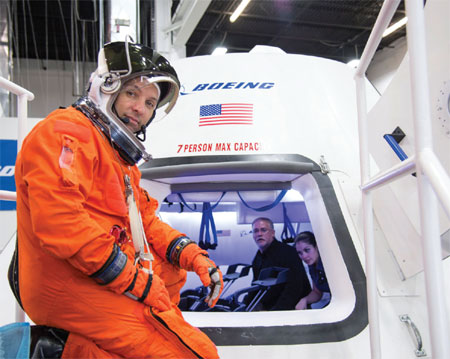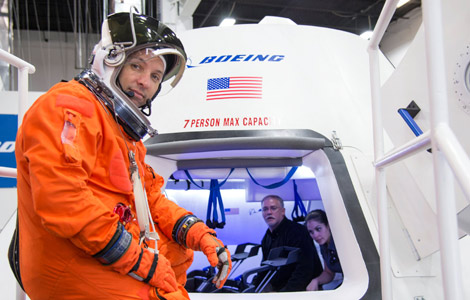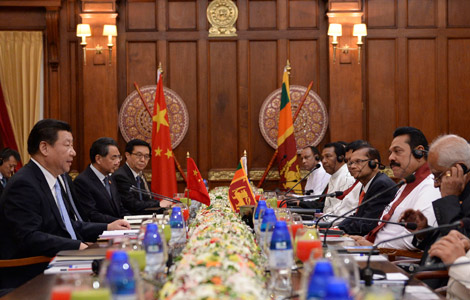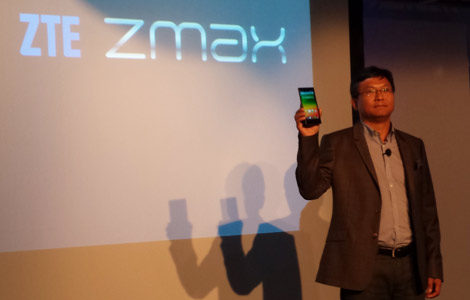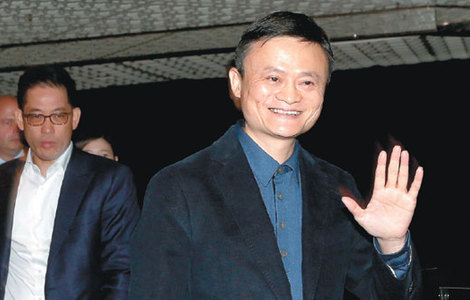Get together in space: experts
Updated: 2014-09-17 11:06
By Chen Weihua in Washington(China Daily USA)
|
||||||||
|
NASA astronaut Randy Bresnik prepares to enter Boeing's CST-100 spacecraft for a fit check evaluation at the company's Houston Product Support Center in this undated image. NASA will partner with Boeing and SpaceX to build commercially owned and operated "space taxis" to fly astronauts to the International Space Station, ending US dependence on Russia for rides, officials said on Tuesday. Reuters / NASA |
Cooperation and collaboration with China on space development and exploration is on the minds of many US experts.
"If we can cooperate with the Russians, our sworn enemy during the Cold War, we can figure out a way to collaborate with the Chinese," said Dale Skran, deputy chair of the policy committee of the National Space Society (NSS), at a seminar in Washington on Tuesday.
He said as a national and international group, NSS favors international collaboration, and is actively reaching out to the Chinese and inviting them to the space development conference that will be held next May in Toronto.
"It just seems that we need to find a way to cooperate with the Chinese. I think it's something we need to do," he said.
Skran expressed his disappointment that National Aeronautics and Space Administration (NASA) personnel cannot even talk with someone in China's national program in a bilateral setting to share information about their work and possible collaboration.
In 2011, the 112ndUS Congress passed a law banning NASA from engaging in bilateral agreements and coordination with China, a decision that drew strong protest from China and many US space experts.
John Olson, vice-president of the Space Systems of Sierra Nevada Corporation, whose products include spacecraft, said China has made extraordinary progress in both robotic and human space flight.
While agreeing that there are issues with China, Olson said China is a force to be reckoned with if people look at China's spacecraft and launches.
"If we don't engage (with China), I think that's detrimental," he said. But Olson also cautioned that the US side should keep its eyes open while cooperating with China.
Jeff Bingham, former senior advisor on space and aeronautics at the US Senate Committee on Commerce, Science and Transportation, pointed out that as some people see the potential of another Cold War with Russia, people don't see the impact the space station could have on relations between Europe, the US and Russia.
"I think that is because there is mutual value in an international partnership. It's important for Russia to be continuing this partnership as it is for us, Europeans, Japanese and the Canadians," he said. The International Space Station is a joint program between the space agencies from the US, Russia, Europe, Japan and Canada.
"So I think that shows there is a basis for developing a partnership that can really succeed in the long term," Bingham said.
However,NASA announced on Tuesday its selection of Boeing and SpaceX to transport US crews to and from the space station using their CST-100 and Crew Dragon spacecraft, respectively, with a goal of ending the nation's sole reliance on Russia in 2017, according to a NASA statement.
Mary Lynne Dittmar, former president and CEO of Dittmar Associates and a member of the Committee on Human Spaceflight of the US National Research Council, also called for cooperation.
She described an upcoming November meeting in Hawaii about leveraging lunar assets for sustainable pathways to space as an opportunity to seek cooperation.
Last year, several US scientists decided to boycott a NASA conference in response to actions by officials at NASA Ames to forbid Chinese nationals from attending the Kepler Science Conference II.
Frank Wolf, a US representative from Virginia who masterminded the 2011 Chinese exclusion bill in Congress, immediately wrote a letter saying that the restrictions only apply to bilateral meetings and activities between NASA and the Chinese government or Chinese-owned companies. The Kepler meeting was a multilateral event.
While political heat in the US Congress is still high, more than 90 astronauts from 18 countries gathered in Beijing from Sept 10-15 for the 27thPlanetary Congress of the Association of Space Explorers (ASE), according to a Xinhua News Agency report.
ASE, founded in 1985, is an international nonprofit professional and educational organization of more than 395 members from 35 nations. The Planetary Congress is its primary forum for professional exchange among US, Russian and world astronauts and cosmonauts.
At the meeting, China announced plans to establish its first space station by around 2022 by building upon the experience of an experimental module already in orbit, according to the Xinhua report.
Sponsored by China's Manned Space Agency, the meeting in Beijing was entitled Cooperation: Realizing Humanity's Space Dream Together. Participants, such as Alexey Leonov, the first man to walk in space, Valentina Tereshkova, the first woman astronaut, and Buzz Aldrin, the second person to land on the moon, shared their experience from their previous manned space missions and predictions for the future. Aldrin was among more than 30 prominent space explorers from the US.
Xu Dazhe, chief of China's space industry, has said that China's space policy has always been very open.
"We are willing to cooperate with all the countries in the world, including the United States and developing countries," he said at the International Space Exploration Forum held in Washington earlier this year.
chenweihua@chinadailyusa.com
Most Viewed
Editor's Picks

|

|

|

|

|

|
Today's Top News
Ma named 'Asia Game Changer of the Year'
FDI dips for 2nd straight month
SF airport launches bilingual website for Chinese tourists
iPhone 6 spawns Chinese satire
China to help Maldives build 1,500 homes
Improved quality 'key to growth', says Li
IMF assesses risks and benefits of shadow banking
Apple Pay eyes inroads to China
US Weekly

|

|
